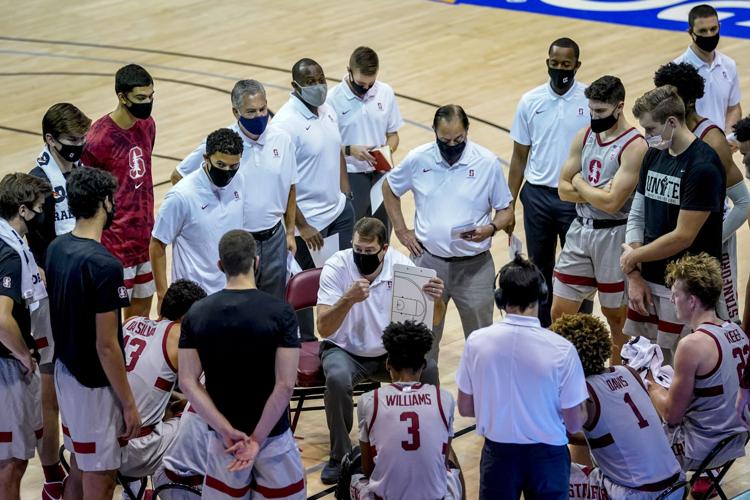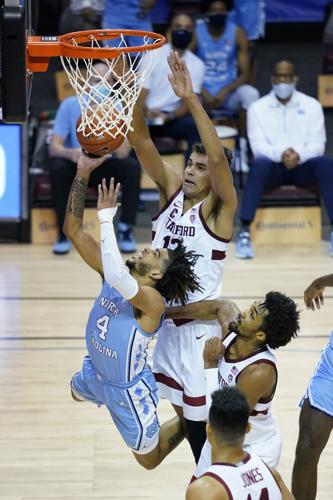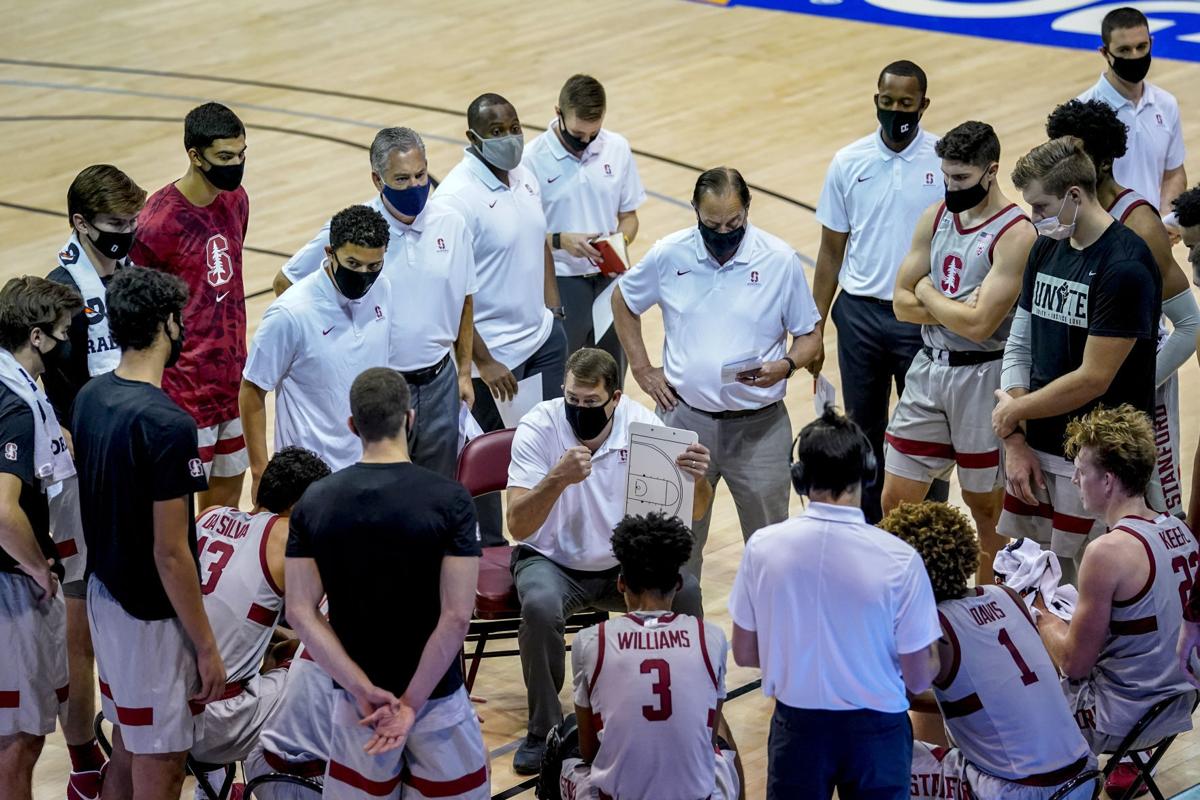Stanford players boarded a jet headed the wrong way to the Maui Invitational last month, so they already knew their tropical business trip was off.
When they landed, the Cardinal found out things were even worse.
They had been marooned.
Thanks to a Santa Clara County health order that came down while Stanford players were in the air — flying to Asheville, North Carolina, to play in the relocated Maui Invitational — the Cardinal learned they would not be able to return home if they wanted to continue playing basketball.
The health order prohibited practices or games within the county until at least Dec. 21, forcing the San Francisco 49ers, Stanford, San Jose State and Santa Clara to all figure out an alternative. Any team that ventured more than 150 miles away would be forced to quarantine upon return — and Stanford was well out of that boundary.
So the Cardinal played its three games in “Maui,” then became temporary residents of Chapel Hill, North Carolina, where coach Jerod Haase had worked as an assistant coach to Roy Williams with the Tar Heels. The team practiced at the Dean Smith Center, took a side trip to play North Carolina A&T in Greensboro, and tried to make the best of it.
“I had a really good pizza, actually, on one of my last nights there, which I have missed,” said Stanford’s German standout, Oscar da Silva. “Being from Germany, real Italian pizza is much more accessible to us. It’s pretty cheap and really good.
“So I enjoyed that and then being in the Smith Center was pretty cool. I think he’s using the facilities there, and being in such a historical place for basketball was a special situation.”
Haase is also taking the upbeat approach — what he calls “glasses half full” — no matter how weird it gets.
No matter that Stanford assistant Adam Cohen, a former UA staffer, had to leave after one game in Asheville in order to return home and serve a quarantine so that he could be on hand for his wife’s scheduled C-section delivery of their son.
No matter that Stanford operations staffers had to assign folks back on The Farm to collect supplies such as extra contact lenses and even a laptop, then get them to North Carolina ASAP.
Fortunately, da Silva said, the players had it easy.
“They shipped some stuff out to us,” da Silva said. “Fortunately, I brought enough things to survive so I didn’t really need anything. But our supporting staff, they’re really grinding, hustling, doing laundry for us, getting everything organized. Big shoutout, thanks to them.”
But even after Stanford left North Carolina, obstacles kept coming, rough even by today’s COVID-19-era standards.

North Carolina guard R.J. Davis (4) leaps to the basket past Stanford forward Oscar da Silva (13) and guard Bryce Wills (2) during the second half of an NCAA college basketball game in the semifinals of the Maui Invitational, Tuesday, Dec. 1, 2020, in Asheville, N.C. (AP Photo/Kathy Kmonicek)
Upon flying to Los Angeles to prepare for a game at USC on Sunday, the Cardinal learned the Trojans had to pause their program because of COVID-19 issues. They then went to practice at Cal State Northridge instead and, a day later, decided to actually play the Matadors.
Stanford won that one 82-71, then boarded a bus to head north … but not too far north. Not to Santa Clara County, that is.
Asked after the Northridge game if the Cardinal could head home briefly or would go straight to Santa Cruz, Haase hedged.
“I can’t give you an honest answer, because it tends to change day by day,” Haase said. “At this point, there are no plans to go back to The Farm, to go back to Stanford. At this point, we’ll head up to Santa Cruz and prepare there. But we’re literally hour by hour, day by day continuing to evolve and adjust and adapt.”
Adapting has been the key. Haase said he’s continued to preach that to his players, who beat Alabama but lost to Indiana and North Carolina in Asheville, while going on to beat North Carolina A&T and Northridge.
“I think it was kind of bittersweet,” da Silva said of playing in Asheville, where Haase even wore a Hawaiian shirt. “We didn’t get the results we wanted, but I think we showed that we can really compete as a basketball team …
“I don’t think we played our best at all but I think it showed us where we stand relative to other really good teams, and then unfortunately we kind of had a lapse against Indiana, so I think the way we left was kind of with a bitter taste in our mouths.”
Of course, Indiana may have had a little scouting help for its 79-63 win: The brother of coach Archie Miller just happens to be UA coach Sean Miller … who has never lost to the Cardinal over his 11-plus seasons with the Wildcats.
Sean Miller also knows this particular Stanford team well; not only does Stanford have many veteran players back, but prized freshman Ziaire Williams, a potential NBA lottery pick, was recruited heavily by the UA.
“What makes Stanford such a good team is that they return a lot of the parts from last year, successful players, upperclassmen that in some cases have had big roles in their program almost from the onset from their freshman year,” Miller said, “then you mix in a guy like Ziaire, and that’s when magical things happen. We know they’re one of the best teams in our conference.”
All that veteran talent, all that maturity, may have helped Stanford forge through the past month. Da Silva said players having their own rooms also helped preserve sanity, allowing them to retreat if needed to get away from it all.
Still, he said, they all spent plenty of time together playing cards or watching TV. Because, as it turned out, Cardinal players ultimately found out they liked hanging out together.
Even if they never really knew where they would be doing so from one moment to the next.
“You know, they might remember if we put together a unity-type presentation or have some kind of a team bonding activity, and that’s great,” Haase said.
“But the things we are going to talk about many years from now is going to be just this experience as a whole, the shared adversities.”






